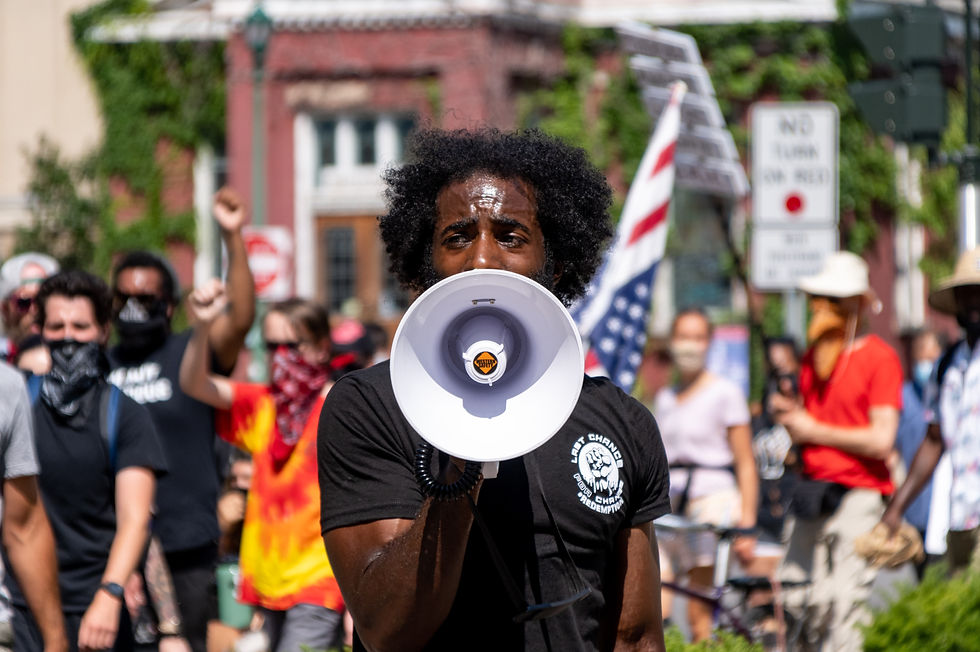BIPOC Activists Fighting for Climate Justice
- katiemortimer2019
- Nov 2, 2022
- 4 min read
Activism and crisis go hand in hand. In the same way that social activism is paramount to implementing change. History shows that activism has played a significant role in ending slavery, promoting equality for women, opposing racism, and countless other important issues.
Those who advocate for these matters are known as ‘activists’. We need activists because some issues have gone too far, are too big, too complicated, or even too terrifying to ignore. Regardless of whether that activist stands alone or becomes part of a group, they are giving a voice to the voiceless:
“As issues expand to a global level, so must activism. But unlike the past, those most affected by certain life debilitating issues do not have the access needed to have their voices heard.”
A recurring problem with activism today is that white voices overpower those of BIack, Indigenous and People Of Colour (BIPOC). But who’s at the forefront of this issue?
Governments and environmental committees are responsible for creating and enforcing rules within a society, defending foreign affairs, sorting the economy and organising public services. They also act on behalf of the country and are supposed to manage things daily. Within that is their influence over environmental affairs.

In an article published on the 14th of June this year, Yessenia Funes perfectly put it:
“Fossil fuel companies and their government allies continue to pollute in the same ways that have already heated the planet by about 1.1 degrees Celsius. They continue to abandon the same communities whose labour and loss fuelled their rise in the first place. In response to the climate crisis, that must all change. World leaders can finally repair centuries of abuse by centering Black, Indigenous, and other people of colour in their efforts to decarbonise societies. For too long, the voices of white people have dominated, silencing everyone else.”
It is worth mentioning that just last month, the United Nations (UN) announced that current country climate pledges would result in the world heating by as much as another 2.6 degrees Celsius… this century…
Regardless, the UN’s Climate Change Agency has said that despite their apparent activism and promised efforts, governments are still doing “nowhere near” enough to limit global heating: “their communities are the ones already living through climate calamity.”
“Solving climate change requires more than cutting emissions. It requires a culture shift that connects us more deeply with nature so that humans can stop exploiting it. It demands an evolution of our economy to incentivise protecting ecosystems rather than destroying them. It asks us to listen to the people who have lived in harmony with the land.” – Yessenia Funes
Leah Thomas - @greengirlleah on Instagram
Leah is the founder of the Intersectional Environmentalist platform. The collective provides resources and information for those interested in dismantling systems of oppression within the environmental movement. They aim to create a more equitable and diverse future for environmentalism.
“When communities of color, who are impacted the most by environmental injustices and are also leading the way in creating solutions, are included in environmental decision-making, movements, and educational systems, environmentalism will be brighter, more equitable, and more revolutionary for all.” – The Intersectional Environmentalist About

Carlos Manuel
Carlos is from the Island of Palau - an archipelago of over 500 islands, with a population of 18,000+. Carlos presented a landmark complaint to the UN’s Committee on the Rights of the Child against governments’ inaction on climate change. According to Greenpeace, at COP25, he said that:
“Everyone had the right to enjoy the planet, but Palau families’ rights are being violated with people forced from their homes by rising sea levels.”
Helena Gualinga - @helenagualinga
Helena is a 20-year-old Kichwa youth from the Sarayaku community of Ecuador. Her upbringing was full of strong women, particularly her mother and aunt, who both advocate for Indigenous rights and environmental justice. Helena has first-hand experience of the climate crisis’ effect on indigenous communities:
“Everyone knows that people on the front lines have not contributed to the climate crisis; we have a sustainable way of living in an extremely respectful relationship to forests, rivers, and animals. We have always advocated for its defense from the oil corporations and industry. But we live with the consequences of what the climate crisis is causing.”
Eric Terena - @ericterena
Eric is a founding member of Mídia Índia, a digital channel publicising indigenous causes in Brazil. Eric continuously champions silenced Indigenous communities in order to make their voices heard:
“Photography and film have both been fantastic tools to raise awareness amongst non-Indigenous peoples and educate white people about our culture so we can work together to preserve our territories and sacred biomes.”
Joycelyn Longdon - @climateincolour
Joycelyn is the creator of Climate in Colour. Studying at the University of Cambridge, Joycelyn advocates for the decolonisation of the climate movement. More recently, she attended the Black EcoFeminist Summit for Intersectional Environmentalism. The event celebrated black feminists fighting for climate justice and:
“Highlight the vast contributions of Black women to the environmental movement and serve as a hub for joy.”
Zion Lights
Zion explained her experiences as a climate activist in an article published for gal-dem. Zion explained that she has “cared about environmental issues for as long as [she] can remember,”. She goes on to say the University was her “first introduction to proper climate activism,” wherein she “always felt out of place,” and “distinctly remember my discomfort around comments on ‘overpopulation’ in my parents’ home country – an argument environmentalists still use today to point blame at poorer countries for environmental issues.” Zion is known for her environmental work and has since been a spokesperson for Extinction Rebellion.
Lead Image Credit: Markus Spiske on Unsplash



Comments